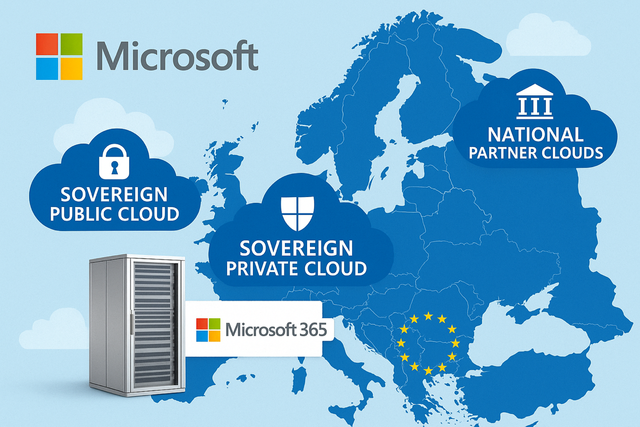Wir dürfen unsere Daten mal behalten!
Nach meinem gestrigen Artikel über Linux-Alternativen kommt heute passenderweise die nächste Meldung zur digitalen Unabhängigkeit: Microsoft baut seine souveränen Cloud-Dienste in Europa massiv aus. Und ehrlich gesagt - das war auch höchste Zeit.
Was Microsoft da plant, ist schon beeindruckend. Der US-Konzern kündigt gleich drei neue Säulen seiner “Sovereign Cloud” an. Das Herzstück ist die Sovereign Private Cloud, bei der Unternehmen ihre Daten komplett unter eigener Kontrolle behalten können. Die Server stehen dann vor Ort, bei Partnern oder wenigstens im eigenen Land - je nachdem, was der Kunde braucht. Besonders interessant: Microsoft 365 Local kommt dazu. Das bedeutet, dass auch Office, Exchange und SharePoint künftig in einer komplett souveränen Umgebung laufen können. Das dürfte vor allem Schulen und Behörden freuen, die seit Jahren mit den Datenschutz-Bedenken kämpfen.
Bei der Sovereign Public Cloud führt Microsoft einen “Data Guardian” ein. Das klingt erstmal nach Marketing-Sprech, aber dahinter steckt was Konkretes: EU-Daten werden nur noch in Europa gespeichert und verarbeitet. Und wenn Microsoft-Mitarbeiter aus den USA Zugriff brauchen? Dann müssen die europäischen Kollegen das erst genehmigen - und alles wird in einem manipulationssicheren Protokoll festgehalten. Das ist schon ein großer Schritt. Bisher mussten wir Microsoft einfach vertrauen, dass sie sich an ihre Versprechen halten. Jetzt gibt’s wenigstens echte technische Barrieren.
Richtig spannend wird’s bei der Verschlüsselung: Kunden können die Schlüsselverwaltung komplett selbst übernehmen oder an vertrauenswürdige Dritte abgeben. Microsoft arbeitet dafür mit HSM-Herstellern wie Utimaco aus Aachen zusammen. Das bedeutet: Selbst Microsoft kann dann nicht mehr an die Daten ran, wenn der Kunde das nicht will.
Als dritte Säule setzt Microsoft auf National Partner Clouds - zum Beispiel mit der SAP-Tochter Delos Cloud für deutsche Behörden. Hier laufen Azure und Microsoft 365 komplett unabhängig von der US-Infrastruktur. Das ist quasi das Maximum an Souveränität, was mit Microsoft-Diensten möglich ist.
Zugegeben - Microsoft reagiert hier auf den Druck aus Europa. Die Diskussionen um digitale Souveränität, DSGVO-Compliance und die Unsicherheiten nach Trump’s Wiederwahl haben ihre Spuren hinterlassen. Aber immerhin reagieren sie. Das Timing ist kein Zufall: Während Amazon in Brandenburg eine komplett neue, unabhängige EU-Cloud aufbaut und Google mit isolierten Private-Cloud-Lösungen punktet, muss Microsoft nachziehen. Der Kampf um das Vertrauen europäischer Kunden ist in vollem Gange.
Für Unternehmen und Behörden sind das durchaus gute Nachrichten. Endlich gibt’s echte Alternativen zur “Alles-oder-Nichts”-Entscheidung bei US-Cloud-Anbietern. Die Sovereign-Lösungen sollen noch dieses Jahr allgemein verfügbar werden - da dürfen wir gespannt sein, wie sich die Preise entwickeln. Klar ist: Die Zeiten, in denen wir blind auf US-Cloud-Dienste gesetzt haben, sind vorbei. Ob Microsoft, Amazon oder Google - sie alle müssen jetzt liefern, wenn sie in Europa weiter mitspielen wollen. Und das ist gut so.
—
After yesterday’s article on Linux alternatives, today brings another fitting piece of news on digital independence: Microsoft is massively expanding its sovereign cloud services in Europe. And honestly – it was about time.
What Microsoft is planning is quite impressive. The US tech giant is introducing three new pillars of its “Sovereign Cloud.” At the core is the Sovereign Private Cloud, where companies can retain full control over their data. The servers are located locally – either with trusted partners or within the customer’s own country, depending on their needs. Particularly noteworthy: Microsoft 365 Local is being added. This means that Office, Exchange, and SharePoint can now run entirely within a sovereign environment. That’s welcome news for schools and public institutions that have been grappling with privacy concerns for years.
In the Sovereign Public Cloud, Microsoft is introducing a “Data Guardian.” Sounds like marketing jargon, but there’s real substance here: EU data will be stored and processed exclusively within Europe. And if US-based Microsoft employees need access? European staff must approve it first – and every step is logged in a tamper-proof system. That’s a significant step forward. Until now, we had to trust Microsoft to keep its word. Now, at least, there are actual technical barriers in place.
Things get even more interesting when it comes to encryption: customers can fully manage their own encryption keys or hand them over to trusted third parties. Microsoft is partnering with HSM providers like Utimaco from Aachen for this. The implication? Even Microsoft can’t access the data unless the customer explicitly allows it.
The third pillar is about National Partner Clouds, such as the collaboration with Delos Cloud (a SAP subsidiary) for German public services. In these setups, Azure and Microsoft 365 operate entirely independently from US-based infrastructure. That’s essentially the highest level of sovereignty possible while still using Microsoft services.
Granted – this is a reaction to mounting pressure from Europe. The ongoing debates around digital sovereignty, GDPR compliance, and uncertainties following Trump’s potential re-election have clearly left their mark. But at least Microsoft is responding. And the timing is no coincidence: Amazon is building a fully independent EU cloud in Brandenburg, and Google is scoring points with its isolated private cloud offerings. Microsoft had to act. The battle for the trust of European customers is well underway.
For businesses and public institutions, this is genuinely good news. Finally, there are real alternatives to the usual “all-or-nothing” choices with US cloud providers. These sovereign solutions are expected to become generally available later this year – and it’ll be interesting to see how pricing develops. One thing’s clear: the days of blindly relying on US-based cloud platforms are over. Whether it’s Microsoft, Amazon, or Google – they all now need to prove themselves if they want to remain competitive in Europe. And that’s a good thing.

Upvoted! Thank you for supporting witness @jswit.